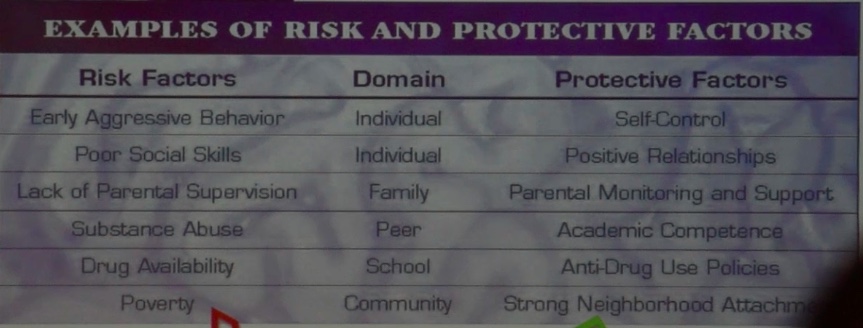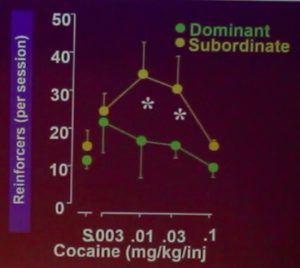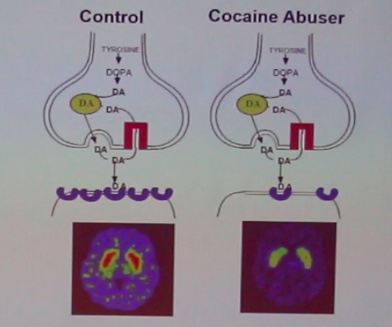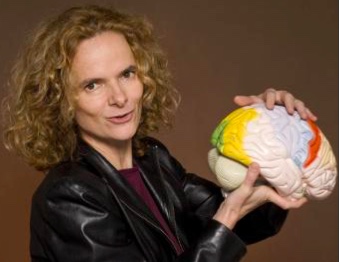Hi all,
This morning I finally had a chance to listen to our debate in Amsterdam from 9th January. And I find that we are not that far apart on some points, though we remain in opposite corners on others. When I posted the slides from my talk and described the evening’s dialogue, my impression was that I was taking on the disease model as a sort of David fighting Goliath (a handy form of grandiosity when you’re the weakling). And while we did and do clash swords at times, maybe that’s only half the story.

One of Nora Volkow’s slides
What does it signify that Nora Volkow talked explicitly about the power of the social environment, the role of stress in triggering relapse, the risk created by growing up poor, with inadequate parental monitoring? What about her emphasis on the value of positive social relationships and support? Her clear (and to my ears novel) discussion of recovery, of the fact that many one-time addicts get over it — for good — which seems a far cry from NIDA’s characterization of addiction as a chronic disease? In fact Nora showed a slide depicting how social subordination (at least in monkeys)  greatly increases vulnerability to addiction — and the brain mechanics that might underlie this relationship. It was a slide I might have used myself, as it identifies addiction as a response to low self-esteem, isolation, and/or frustration — a point that Carl Hart or Johann Hari or I might just as easily have made.
greatly increases vulnerability to addiction — and the brain mechanics that might underlie this relationship. It was a slide I might have used myself, as it identifies addiction as a response to low self-esteem, isolation, and/or frustration — a point that Carl Hart or Johann Hari or I might just as easily have made.
What I think it shows is that Nora Volkow is talking about addiction in a broader light than ever before, paying homage to the social, psychological, and even societal forces that get people to take drugs. And maybe it shows that Nora Volkow can lead NIDA and similar organizations into a more evolved understanding of addiction, rather than serve as an anchor that holds the disease model in place. In fact — and this is purely speculation — maybe Nora finds herself between a rock and a hard place, trying to balance the pathology-oriented brain data (and the research program that spawns it) against insights that are sensitive, humanistic, and true to the actual experience and context of addiction in our society. And/or maybe Stanton Peele, Bruce Alexander, Maia Szalavitz, Carl Hart and others (like me) have been nipping at her heels to some effect.
 She and I still have our differences of course. I can’t stand her slides showing big red or yellow splotches on the brain scans comparing cocaine addicts to “normals”. She and her colleagues certainly know that cocaine and other psychostimulants compile dopamine in the synapses, unlike the many other addictive drugs that do no such thing, which could easily explain a temporary blunting of dopamine metabolism as a compensation. Yet she points to those slides and says: see, look how different their brains are. Not fair! And she still talks about addiction as destroying will power, which still seems to me entirely wrong-headed (though that’s sometimes how it seems). And then I wonder, is that her talking, or is that the NIDA party line? And if it’s the latter, then maybe she really is walking a kind of professional tightrope or perhaps struggling with her own intuitions while trying to be a good scientist. I know that feeling myself.
She and I still have our differences of course. I can’t stand her slides showing big red or yellow splotches on the brain scans comparing cocaine addicts to “normals”. She and her colleagues certainly know that cocaine and other psychostimulants compile dopamine in the synapses, unlike the many other addictive drugs that do no such thing, which could easily explain a temporary blunting of dopamine metabolism as a compensation. Yet she points to those slides and says: see, look how different their brains are. Not fair! And she still talks about addiction as destroying will power, which still seems to me entirely wrong-headed (though that’s sometimes how it seems). And then I wonder, is that her talking, or is that the NIDA party line? And if it’s the latter, then maybe she really is walking a kind of professional tightrope or perhaps struggling with her own intuitions while trying to be a good scientist. I know that feeling myself.
 I quite like this woman. Her very expressive face (sometimes pleasant, sometimes fierce) is currently looking up at me from the cover of LEF magazine, a Dutch publication for addicts and those who live or work with them. I admire her energy and her devotion to data, not to mention the heap of accomplishments she’s contributed as an active neuroscientist — regardless of or despite her role as the head of NIDA. So I’ll end with a paragraph from an email I just sent her.
I quite like this woman. Her very expressive face (sometimes pleasant, sometimes fierce) is currently looking up at me from the cover of LEF magazine, a Dutch publication for addicts and those who live or work with them. I admire her energy and her devotion to data, not to mention the heap of accomplishments she’s contributed as an active neuroscientist — regardless of or despite her role as the head of NIDA. So I’ll end with a paragraph from an email I just sent her.
Hi Nora,
I finally had a chance to listen to the recording made that evening in Amsterdam. I want to say that I have now really listened to your words, and I see that our perspectives are getting more and more convergent. Your emphasis on environmental factors, on the importance of social support in recovery, your discussion of diversity in outcomes…so many things we actually agree on. And of course we also agree (and I acknowledged) how important it is to stop blaming and start helping. I feel a bit guilty, partly because you were so tired that night — I thought it was heroic that you spoke so energetically and clearly after three days of meetings and talks..and jet lag — but also because my main points were critical of the traditional disease model, and maybe I didn’t acknowledge how much your thinking seems to be increasingly comprehensive, and how much common ground we can find.

Leave a Reply to carl Cancel reply